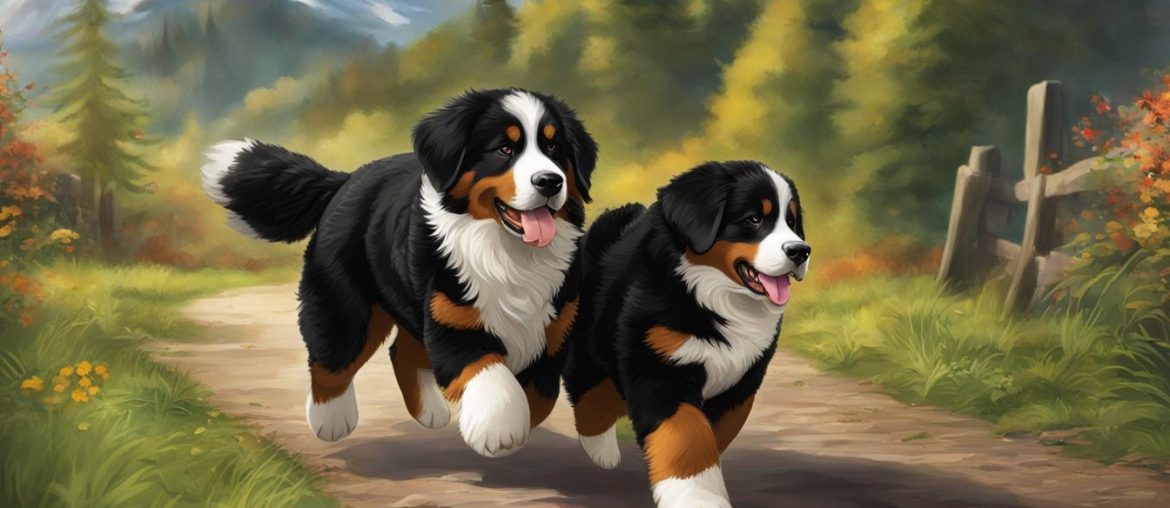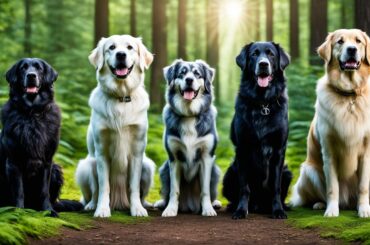Bernese Mountain Dogs are known for their alert and good-natured temperament, making them excellent household companions. With a working background, they enjoy learning new things and have natural instincts for guarding and farm work. As family pets, they thrive on human companionship and are eager to please. Proper socialization is important to ensure they are patient with other dogs and children. They require moderate exercise and make great walking partners.
Key Takeaways
- Bernese Mountain Dogs have an alert and good-natured temperament.
- They enjoy learning new things and have natural instincts for guarding and farm work.
- They thrive on human companionship and are eager to please.
- Proper socialization is important for their interaction with other dogs and children.
- They require moderate exercise and make great walking partners.
Bernese Mountain Dog Size and Attributes
The Bernese Mountain Dog is a large breed, known for its impressive size and majestic appearance. Males typically weigh between 90-120 lbs, while females range between 70-100 lbs. In terms of height, males stand at 25-27.5 inches, and females measure 23-26 inches. These measurements contribute to their powerful and sturdy build, making them well-suited for their historical roles as working dogs.
One of the standout attributes of the Bernese Mountain Dog is its beautiful coat. It is thick, medium-length, and features a distinctive tri-colored pattern consisting of black, white, and rust markings. This luxurious coat not only adds to their aesthetic appeal but also provides insulation against cold weather, making them adaptable to various climates.
Grooming is an essential aspect of caring for a Bernese Mountain Dog. Due to their dense coat, regular brushing is necessary to prevent matting and keep their fur in good condition. Additionally, they shed moderately year-round and experience more heavy shedding twice a year during seasonal transitions.
| Attribute | Males | Females |
|---|---|---|
| Weight Range | 90-120 lbs | 70-100 lbs |
| Height Range | 25-27.5 inches | 23-26 inches |
| Coat | Thick, medium-length, tri-colored (black, white, rust) | |
Overall, the size and attributes of the Bernese Mountain Dog contribute to its unique charm and presence. Their large size combined with their striking coat makes them a visually appealing breed. However, their size also requires regular grooming and maintenance to keep them looking their best.
Bernese Mountain Dog Personality Traits

When it comes to personality traits, Bernese Mountain Dogs are known for their gentle and friendly nature. They are incredibly loyal and devoted to their families, making them excellent family pets. These dogs are especially good with children and other pets, and their intelligence and eagerness to please make them easy to train.
One of the standout qualities of Bernese Mountain Dogs is their alertness, which makes them great watchdogs. They have a laid-back energy level and are generally known to be affectionate with their families. However, some individuals may tend to bark more than desired, so proper training and socialization are key to address this behavior.
Overall, Bernese Mountain Dogs are perfect for families looking for a loving and loyal companion. Their gentle nature, intelligence, and devotion to their loved ones make them a delightful addition to any household.
Bernese Mountain Dog Personality Traits at a Glance:
- Gentle and friendly
- Loyal and devoted to their families
- Good with children and other pets
- Intelligent and easy to train
- Alert and make good watchdogs
- Laid-back energy level
- Affectionate with their families
- Potential for excessive barking
| Personality Traits | Rating (1-10) |
|---|---|
| Loyalty | 10 |
| Gentleness | 9 |
| Trainability | 8 |
| Friendliness | 9 |
| Watchdog Ability | 7 |
Bernese Mountain Dog History

The Bernese Mountain Dog has a rich history that dates back to the mountains of Switzerland. Originally bred as working dogs, they played a vital role in pulling carts, herding livestock, and protecting farms in the Swiss Alps. These dogs were known as “Berners” and were highly regarded for their strength, intelligence, and versatility.
The origins of the Bernese Mountain Dog can be traced back to several centuries ago. It is believed that the breed is a descendant of large mastiff-type dogs that were brought to Switzerland by the Romans. Over time, these dogs were crossed with local farm dogs, resulting in the development of the Bernese Mountain Dog breed we know today.
Professor Albert Heim, a Swiss geologist and dog enthusiast, played a significant role in the preservation and improvement of the Bernese Mountain Dog breed. In the early 1900s, the breed faced near-extinction due to various factors, including the decline in demand for working dogs. Professor Heim recognized the breed’s potential and worked to revive and strengthen it through careful selective breeding.
Thanks to Professor Heim’s efforts, the breed’s size and temperament were refined, and the Bernese Mountain Dog gained recognition and popularity. The breed’s original name was “durrbachler,” named after the Durrbach region in Switzerland where they were commonly found. However, in 1907, the name was changed to “Bernese Mountain Dog,” reflecting their association with the Bernese Oberland region.
Bernese Mountain Dog History Timeline:
| Year | Event |
|---|---|
| 1902 | Professor Albert Heim plays a key role in preserving and improving the Bernese Mountain Dog breed |
| 1907 | The breed’s name is changed to “Bernese Mountain Dog” |
| 1937 | The Bernese Mountain Dog Club of America is founded |
| 1990s | The breed gains international recognition and popularity |
| 2001 | The Bernese Mountain Dog is recognized by the American Kennel Club |
Today, the Bernese Mountain Dog is cherished for its beauty, loyalty, and gentle nature. Whether as a working dog or a beloved family companion, their rich history continues to shape their reputation as a remarkable breed.
Bernese Mountain Dog Care and Grooming

Proper care and grooming are essential for keeping your Bernese Mountain Dog healthy and happy. Here are some key aspects to consider:
Daily Exercise:
Bernese Mountain Dogs require moderate exercise to maintain their energy levels and overall well-being. A daily 20-40 minute walk or playtime in a fenced yard is recommended. Regular exercise helps prevent weight gain and promotes cardiovascular health.
Grooming and Coat Care:
The Bernese Mountain Dog’s thick coat requires regular brushing to prevent matting and remove loose hair. Aim to brush your dog at least 2-3 times a week. During shedding seasons, more frequent brushing may be necessary. Additionally, occasional baths can help maintain the cleanliness of their coat.
Nail Trimming and Oral Care:
Trim your Bernese Mountain Dog’s nails regularly to prevent overgrowth and discomfort. Check their ears weekly for any signs of infection or debris accumulation. Brushing their teeth regularly with dog-friendly toothpaste and providing dental chews can help maintain their oral health.
Longevity and Health:
While Bernese Mountain Dogs bring joy and companionship, their average lifespan is relatively short, typically ranging from 7 to 9 years. To ensure their best possible health, regular veterinary check-ups, vaccinations, and preventive measures are crucial. Keep an eye out for potential breed-specific health issues such as hip and elbow dysplasia, cancer, and bloat.
| Grooming Needs | Exercise Requirements | Average Lifespan |
|---|---|---|
| Medium | Moderate | 7-9 years |
Regular exercise, proper grooming, and routine veterinary care are key to ensuring the well-being of your Bernese Mountain Dog. By providing them with the care they need, you can enjoy a happy and healthy companion by your side.
Bernese Mountain Dog Training and Socialization
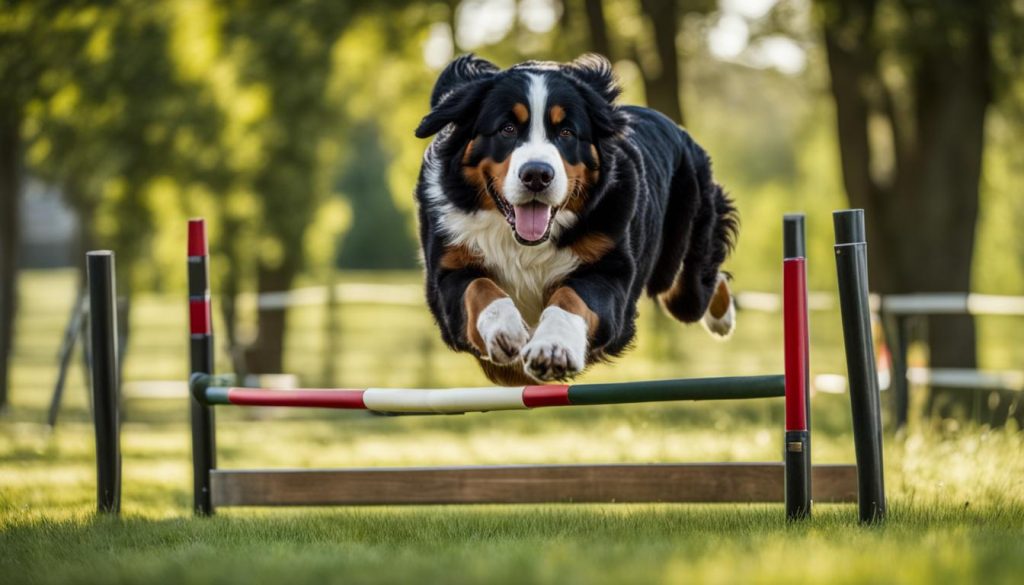
Training and socialization are crucial aspects of raising a Bernese Mountain Dog. With their intelligence and eagerness to please, these dogs are generally receptive to training, but their slow maturing process requires patience and consistency. Early obedience training is important due to their large size and exuberant nature.
Positive reinforcement techniques, such as clicker training, work well with Bernese Mountain Dogs. They respond well to rewards and praise, making training sessions enjoyable for both the dog and the owner. It’s important to focus on building a strong bond with your Bernese Mountain Dog and establishing yourself as the pack leader.
Proper socialization is equally important to ensure your Bernese Mountain Dog is friendly and patient with other dogs and children. Exposing them to various environments, people, and animals from a young age will help them develop into well-rounded and confident dogs. Positive interactions and experiences will prevent them from becoming anxious or fearful in new situations.
Training Tips:
- Start training your Bernese Mountain Dog as early as possible.
- Use positive reinforcement techniques, such as treats and praise, to motivate and reward good behavior.
- Keep training sessions short and fun to maintain their interest and attention.
- Be patient and consistent with your training approach.
- Focus on building a strong bond with your dog and establishing yourself as the pack leader.
- Enroll in obedience classes or hire a professional dog trainer if needed.
Socialization Tips:
- Expose your Bernese Mountain Dog to various people, animals, and environments from a young age.
- Arrange playdates with other friendly dogs to promote positive interactions.
- Take your dog on regular outings to parks, pet-friendly stores, and other public places.
- Reward your dog for calm and friendly behavior in social situations.
- Be aware of your dog’s body language and intervene if they seem uncomfortable or anxious.
- Provide plenty of mental and physical stimulation to keep your Bernese Mountain Dog happy and well-adjusted.
With appropriate training and socialization, your Bernese Mountain Dog can grow into a well-behaved and confident companion. Remember to be patient, consistent, and positive throughout the training process.
Bernese Mountain Dog Health and Longevity
The health and longevity of Bernese Mountain Dogs are important considerations for prospective owners. While these gentle giants bring joy and companionship to families, they are prone to certain health problems that can impact their lifespan.
One common health issue in Bernese Mountain Dogs is hip dysplasia, a condition where the hip joint doesn’t develop properly, leading to pain and mobility issues. Regular veterinary check-ups can help catch and address this condition early on, and proper nutrition and weight management play a crucial role in minimizing its impact.
Bernese Mountain Dogs are also susceptible to cancer, particularly a type that affects their white blood cells. Regular screenings and awareness of the warning signs can aid in early detection and treatment. Additionally, blood disorders, progressive retinal atrophy, and bloat are among the other health concerns that can affect this breed.
| Health Problem | Prevalence | Treatment |
|---|---|---|
| Hip Dysplasia | Common | Surgery, pain management, weight management |
| Cancer | Common | Chemotherapy, surgery, radiation therapy |
| Blood Disorders | Occasional | Medication, blood transfusions |
| Progressive Retinal Atrophy | Occasional | No cure, management of symptoms |
| Bloat | Occasional | Emergency veterinary care, surgery |
Despite these health concerns, Bernese Mountain Dogs can still lead happy and fulfilling lives with proper care, regular exercise, and a balanced diet. Owners must be proactive in monitoring their dog’s health and providing them with a safe and nurturing environment.
Bernese Mountain Dog as a Family Pet

The Bernese Mountain Dog is an excellent choice for families looking for a loyal and affectionate companion. With their gentle nature and friendly demeanor, they make wonderful family pets. Whether it’s playing with children or getting along with other pets, Bernese Mountain Dogs have a reputation for being good with both. Their patient and nurturing nature ensures that they are gentle and protective, making them great with kids of all ages.
When it comes to being a family companion, Bernese Mountain Dogs excel. They thrive on human companionship and love being included in family activities. Whether it’s going for walks, playing in the yard, or simply lounging around the house, Berners are happy to be by their family’s side. Their loyalty and devotion make them an integral part of the family, providing love and companionship that is unmatched.
Please be aware that while Bernese Mountain Dogs are great with children and other pets, proper socialization is key. Early socialization helps them develop the necessary skills to interact positively with others. This includes exposing them to different environments, people, and animals from an early age. With proper training and socialization, Berners can become the perfect family pet.
The Benefits of Having a Bernese Mountain Dog as a Family Pet
- Excellent with children: Berners are known for their gentle and patient nature, making them a great playmate for kids.
- Gets along with other pets: Bernese Mountain Dogs are friendly towards other animals, making them a good fit for multi-pet households.
- Loyal and devoted: They form strong bonds with their family members and will always be there to provide love and support.
- Eager to please: Berners are highly trainable and eager to please their owners, making them easy to integrate into family routines.
- Great for outdoor activities: Their moderate exercise needs make them the perfect companion for family hikes, walks, and outdoor adventures.
Overall, the Bernese Mountain Dog is an ideal family pet due to their gentle nature, adaptability, and love for family life. With proper care, training, and socialization, they can bring joy and happiness to any household.
Bernese Mountain Dog Adoption and Buying Tips
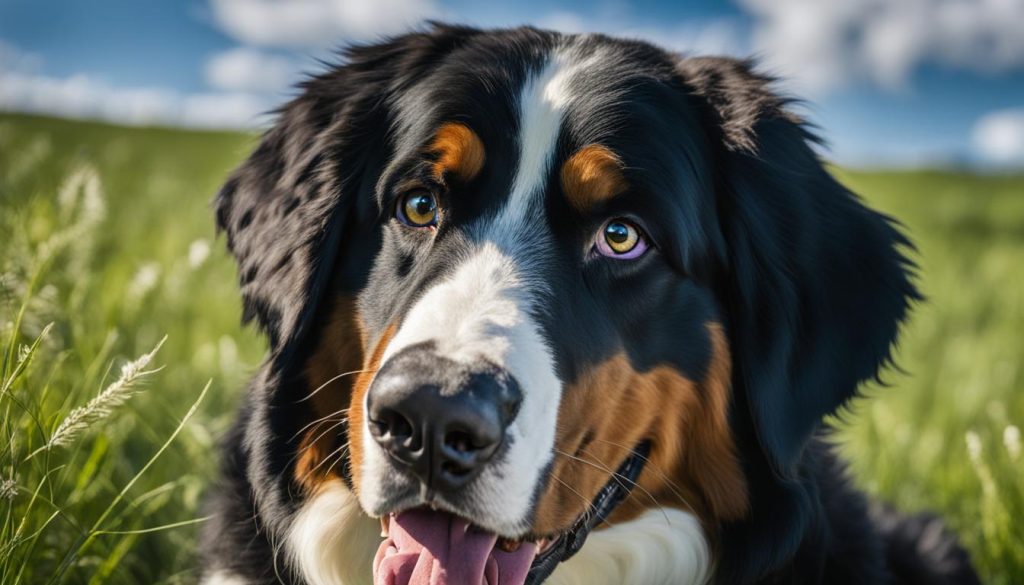
When considering a Bernese Mountain Dog, there are important factors to keep in mind for a successful adoption or purchase. One option is to prioritize adoption from rescue organizations or shelters. By adopting a Bernese Mountain Dog, you provide a loving home to a dog in need and contribute to reducing pet overpopulation. Adoption fees typically cover vaccinations, spaying/neutering, and sometimes microchipping, making it a cost-effective choice.
If you decide to buy a Bernese Mountain Dog puppy, it’s essential to choose a reputable breeder. Thorough research is crucial to ensure ethical breeding practices, health screenings, and a nurturing environment for the puppies. A reputable breeder will prioritize the health and well-being of their dogs, providing appropriate socialization and care from an early age.
When interacting with a breeder, ask for documentation of health clearances for both the puppy’s parents. This helps ensure that the puppy is less likely to develop hereditary health issues such as hip and elbow dysplasia, which are common in the breed. A responsible breeder will gladly provide this information and be transparent about any potential health risks.
Remember to visit the breeder’s facility in person to assess the living conditions and meet the puppy’s parents if possible. A reputable breeder will encourage your visit and allow you to observe the puppies’ environment. Pay attention to cleanliness, socialization, and the overall well-being of the dogs. If the breeder exhibits any red flags such as multiple litters available or an unwillingness to answer your questions, it is best to consider another breeder.
Benefits of Adoption
Adopting a Bernese Mountain Dog from a rescue organization or shelter provides several advantages. Firstly, you provide a loving home to a dog that may have had a challenging past. These dogs often show immense gratitude and make incredibly loyal and devoted family pets.
Additionally, adopting a Bernese Mountain Dog can be more cost-effective. Adoption fees are usually lower than the cost of purchasing a puppy from a breeder. The fees often include initial vaccinations, spaying/neutering, and sometimes microchipping, saving you money on these essential services.
Benefits of Buying from a Reputable Breeder
Buying a Bernese Mountain Dog puppy from a reputable breeder offers its own unique benefits. One advantage is being able to select a puppy that matches your preferences and lifestyle from an early age. Additionally, reputable breeders prioritize health screenings and genetic testing, reducing the risk of hereditary health conditions in the puppy.
Another benefit is the opportunity to build a strong foundation for training and socialization. Puppies from reputable breeders are typically already exposed to various stimuli and experiences, setting them up for success in their new homes. Furthermore, reputable breeders often provide ongoing support and guidance, allowing you to navigate any challenges that may arise during the puppy’s growth and development.
| Comparison Table: Adoption vs. Buying | |
|---|---|
Adoption
|
Buying from a Reputable Breeder
|
Ultimately, whether you choose adoption or buying, it is essential to prioritize the well-being and future of the Bernese Mountain Dog. Both options can lead to a fulfilling and loving relationship with this wonderful breed.
Bernese Mountain Dog Pros and Cons
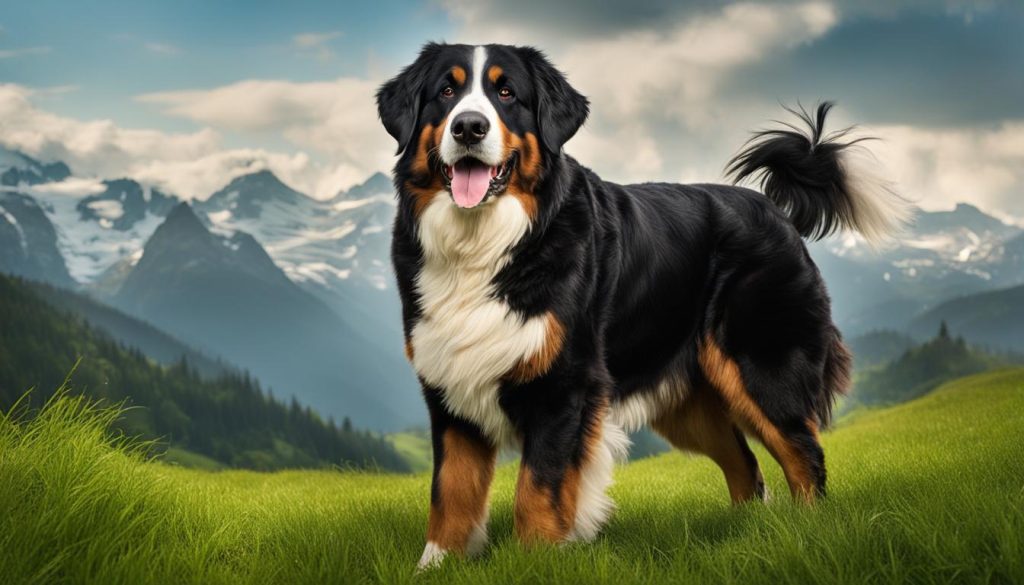
When considering adding a Bernese Mountain Dog to your family, it’s important to weigh the pros and cons of owning this beautiful breed. Here are some advantages and disadvantages to keep in mind:
Pros of owning a Bernese Mountain Dog:
- Excellent family pets: Bernese Mountain Dogs are known for their loyalty, devotion, and gentle nature, making them great companions for families.
- Energetic without being exhausting: These dogs have a laid-back energy level, making them a good fit for households that enjoy moderate exercise and outdoor activities.
- Trainable: Bernese Mountain Dogs are intelligent and eager to please, making them relatively easy to train. Positive reinforcement techniques work well with this breed.
Cons of owning a Bernese Mountain Dog:
- Short lifespan: Unfortunately, Bernese Mountain Dogs have a relatively short life expectancy of 7 to 10 years, which is shorter than average for large breeds.
- Heavy shedding: The breed’s thick coat requires regular brushing to prevent matting, and they shed heavily twice a year. This can be a challenge for owners who prefer a low-shedding dog.
- Drooling tendencies: Bernese Mountain Dogs are known to drool, which can be a concern for some owners, particularly those who prefer a cleaner household.
While Bernese Mountain Dogs have their pros and cons, the decision to bring one into your family ultimately depends on your lifestyle, preferences, and ability to provide the care and attention they need. Consider all factors carefully to determine if this breed is the right fit for you and your household.
| Pros | Cons |
|---|---|
| Excellent family pets | Short lifespan |
| Energetic without being exhausting | Heavy shedding |
| Trainable | Drooling tendencies |
Wrapping Up
To summarize, the Bernese Mountain Dog is a truly remarkable breed. With their beautiful tri-colored coat and friendly temperament, they make excellent household companions. Their natural instincts for guarding and farm work, combined with their intelligence and eagerness to please, make them versatile working dogs as well.
When considering a Bernese Mountain Dog as a family pet, it’s important to note their moderate exercise and grooming needs. They require regular walks and mental stimulation to keep them happy and healthy. Their thick coat requires regular brushing to prevent matting, and they do shed moderately throughout the year.
Although Bernese Mountain Dogs have a relatively short lifespan compared to other breeds, their loyalty, devotion, and gentle nature more than make up for it. They are great with children and other pets, and their laid-back energy level makes them a joy to have around. By providing them with proper care, training, and socialization, you can enjoy a loving and fulfilling relationship with your Berner for many years to come.
To summarize, the Bernese Mountain Dog is a wonderful choice for families looking for a loyal and gentle companion. Their loving nature, combined with their striking appearance, makes them a truly special breed. Whether you choose to adopt or buy a Bernese Mountain Dog, be prepared to provide them with the love and care they deserve. With their charming personality and unwavering loyalty, they will surely bring happiness and joy to your home.
FAQ
What is the temperament and personality of a Bernese Mountain Dog?
Bernese Mountain Dogs have a gentle and friendly nature. They are loyal, devoted, and good with children and other pets. They are known for being alert and make good watchdogs. However, some individuals may bark more than desired. Overall, they have a laid-back energy level and are known to be affectionate with their families.
What is the size and weight range of a Bernese Mountain Dog?
Bernese Mountain Dogs are a large breed with a weight range of 90-120 lbs for males and 70-100 lbs for females. They have a height of 25-27.5 inches for males and 23-26 inches for females.
What is the history of the Bernese Mountain Dog?
The Bernese Mountain Dog originated in Switzerland and was first bred as a working dog for pulling carts, herding livestock, and protecting farms. They were popularly known as “Berners” and played a crucial role in the Swiss Alps. Professor Albert Heim played a significant role in preserving the breed from near extinction and improving their size and temperament through selective breeding.
What are the grooming needs of a Bernese Mountain Dog?
Bernese Mountain Dogs have a thick and medium-length coat that requires regular brushing to prevent matting. They shed moderately year-round and heavily twice a year. Moderate grooming needs are characteristic of this breed.
How trainable are Bernese Mountain Dogs?
Bernese Mountain Dogs are intelligent and eager to please, making them relatively easy to train. However, they are slow to mature both physically and mentally, so training should be gradual and consistent. Proper socialization is essential to ensure they are patient and friendly with other dogs and children. Positive reinforcement training techniques, such as clicker training, work well with this breed.
What are the common health issues of Bernese Mountain Dogs?
Bernese Mountain Dogs are prone to certain health problems, including hip and elbow dysplasia, blood disorders, cancer (especially a type affecting white blood cells), progressive retinal atrophy, and bloat. Regular veterinary check-ups are important to catch and address any health problems early on.
Are Bernese Mountain Dogs good family pets?
Yes, Bernese Mountain Dogs are excellent family pets. They are known for their loyalty, devotion, and gentle nature, making them great with children and other pets. They thrive on human companionship and love being included in family activities.
What should I consider when adopting or buying a Bernese Mountain Dog?
When considering a Bernese Mountain Dog, it is advisable to prioritize adoption from rescue organizations or shelters. This provides a loving home to a dog in need. If purchasing a Bernese Mountain Dog puppy, it is crucial to choose a reputable breeder. Thorough research should be conducted to ensure ethical breeding practices, health screenings, and a nurturing environment for the puppies.
What are the pros and cons of owning a Bernese Mountain Dog?
Bernese Mountain Dogs have several pros, including being excellent family pets, loyal, devoted, and energetic without being exhausting. However, they also have a relatively short lifespan, heavy shedding, and drooling tendencies that can be considered cons. Their heavy coat may not be suitable for warm climates, and they require access to a yard due to their size.


